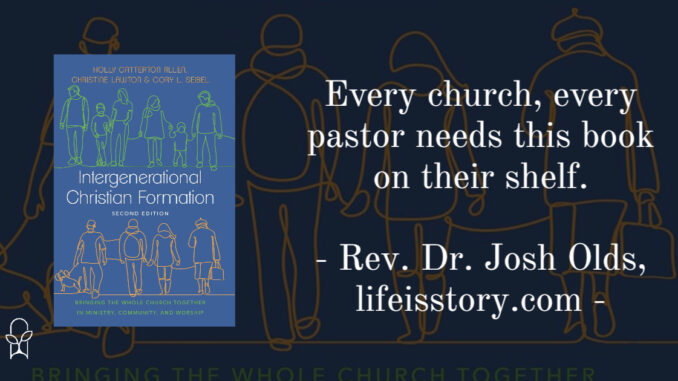
Also by this author: Forming Resilient Children: The Role of Spiritual Formation for Healthy Development
Published by IVP Academic on June 12, 2023
Genres: Academic, Non-Fiction, Christian Life, Leadership
Buy on Amazon
Goodreads

Most churches and faith communities segment their ministries by age and generation. In some congregations, people may never interact with those of other ages. But it was not always so. Throughout biblical tradition and the majority of history, communities of faith included people of all ages together in corporate worship, education, and ministry. The church was not just multigenerational; it was intergenerational, with the whole church together as one family and people of all ages learning from one another in common life.
The process of becoming Christlike does not happen alone, and intergenerational faith communities are designed for Christian formation. All generations are gifted parts of the body, and churches need all the parts. In this comprehensive text, Holly Allen, Christine Lawton, and Cory Seibel offer a complete framework for intentional intergenerational Christian formation. They provide the theoretical foundations for intergenerationality, showing how learning and spiritual formation are better accomplished through intergenerational contexts. Then the authors give concrete guidance for intergenerational praxis on how worship, learning, community, and service can all be achieved intergenerationally. Case studies of intergenerational congregations provide models for how a culture of intergenerationality can be created in local churches.
This second edition has been revised and updated throughout with new empirical research, intergenerational spiritual practices, and Gen Z realities, with fresh stories of intergenerational formation both in the US and around the world. Discover the riches of intergenerational ministry, and let all generations commend the works of God to one another.
Small groups have always been the key to Christian discipleship. The Sunday morning service is a mostly collective celebration, but the emphasis in many mid-size to larger churches when it comes to discipleship is the development of the small group and Sunday School classes. I remember, growing up, there was a Sunday school class for every age group and then adult groups were divided into young adults, young married, adults (with the assumption you were married), and seniors. In larger churches, I have seen these subdivided into singles (and ready to Christian Mingle), widowed, young professionals, and any sort of subdivision that seems to make sense for their context. Even in the Sunday service context, many churches have divided themselves into a children’s church and a main adult service. I’ve seen churches have separate, simultaneous services for kids, middle/high school, and adults. The point being, there’s a lot of age segregation going on in the church. Intergenerational Christian Formation: Bringing the Whole Church Together in Ministry, Community, and Worship is a comprehensive textbook that carefully and clearly explains why this method is harming our churches.
Originally written in 2012, Intergenerational Christian Formation is now in a second edition. A lot has changed in ten years. It’s not the original is out of date, but rather this new edition reflects on a decade of influence the first edition has had. There are updated statistics, deeper theological reflections, new anecdotes, Gen Z is now integrated into the context, there’s a greater global focus—but the core concepts and content remain the same. The authors are Holly Catterton Allen, founding director of InterGenerate, a conference on intergenerational ministry; Christine Lawton, director of the Christian education program at Concordia University Irvine; and Cory Seibel, pastor at Central Baptist Church in Alberta. That connection of educators and pastors brings a welcome blend of the scholarly and the pastoral—ensuring academic rigor but also practical pastoral application. Empirical research collides with practical application to give readers substantive and proven methods for how and why to build intergenerational ministry.
The first half of the book sets the context for building intergenerationality, detailing the historical movements away from and back to collective, all-ages worship. The authors also take a deep dive into Scripture to build the biblical basis for intergenerational ministry. This background in the first half sets the stage for the practical outworking of how intergenerational ministry can work. The book offers numerous case studies and examples of how churches can incorporate multigenerational programming into various aspects of church life, including worship, Bible study, mission, and service. These practical examples and the appendix are rich with ideas that are simple, approachable, and designed to embrace an intergenerational strategy.
Intergenerational Christian Formation is a book that, as a pastor, I’ll be returning to time and time again. Every church needs this book on their shelf. Too often, in an attempt to be the most relevant or the most targeted, churches have lost part of what can make them unique. Scripture says that there is neither “Jew nor Greek, slave nor free, male nor female, for you are all one in Christ Jesus.” To that I add, there is neither young nor old—the church is meant to be a place where the societal hierarchies break down. It is a place where all people from all walks of life, whose commonality is the shared indwelt Spirit within, join together through that Spirit to worship and flourish.
